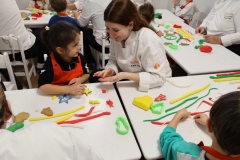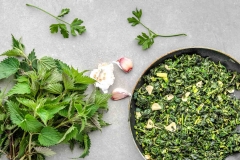
SCHOOL OF APPLIED MANAGEMENT SCIENCES
Gastronomy and Culinary Arts Program
CLM 480 | Course Introduction and Application Information
| Course Name |
Commercial Food Production
|
|
Code
|
Semester
|
Theory
(hour/week) |
Application/Lab
(hour/week) |
Local Credits
|
ECTS
|
|
CLM 480
|
Fall/Spring
|
3
|
0
|
3
|
5
|
| Prerequisites |
None
|
|||||
| Course Language |
English
|
|||||
| Course Type |
Service Course
|
|||||
| Course Level |
First Cycle
|
|||||
| Mode of Delivery | - | |||||
| Teaching Methods and Techniques of the Course | - | |||||
| Course Coordinator | - | |||||
| Course Lecturer(s) | - | |||||
| Assistant(s) | - | |||||
| Course Objectives | Acquiring necessary knowledge and skills in commercial food production and services |
| Learning Outcomes |
The students who succeeded in this course;
|
| Course Description | In this course, the organizational structure of the commercial food and beverage service enterprises, management process and planning of their operations will be explained. The functions of management in commercial food production will be examined in detail and will be explained with cases from enterprises. |
|
|
Core Courses | |
| Major Area Courses | ||
| Supportive Courses |
X
|
|
| Media and Management Skills Courses | ||
| Transferable Skill Courses |
WEEKLY SUBJECTS AND RELATED PREPARATION STUDIES
| Week | Subjects | Related Preparation |
| 1 | Introduction | The Restaurant from concept to operation Walker chapter 1 p.5-21 |
| 2 | Defining and classifying commercial food production | The Restaurant from concept to operation Walker chapter 2 p.25-56 |
| 3 | Development trends in commercial food production | The Restaurant from concept to operation Walker chapter 3 p.61-100 |
| 4 | Characteristics of commercial food businesses | The Restaurant from concept to operation Walker chapter 4 p.107-137 |
| 5 | Management of commercial food businesses | The Restaurant from concept to operation Walker chapter 5 p.146-167 |
| 6 | Factors influencing the management of commercial food businesses | The Restaurant from concept to operation Walker chapter 6 p.169-185 |
| 7 | Managerial problems in commercial food businesses | The Restaurant from concept to operation Walker chapter 6 p.169-185 |
| 8 | Midterm Examination | |
| 9 | Basic functions of commercial food businesses | The Restaurant from concept to operation Walker chapter 7 p.190-216 |
| 10 | Planning of the services | The Restaurant from concept to operation Walker chapter 8 p.220-244 |
| 11 | Organizational structures | The Restaurant from concept to operation Walker chapter 9 p.246-274 |
| 12 | Marketing function in commercial food businesses | The Restaurant from concept to operation Walker chapter 10 p.280-301 |
| 13 | Marketing function in commercial food businesses | The Restaurant from concept to operation Walker chapter 11 p.305-327 |
| 14 | Marketing function in commercial food businesses | The Restaurant from concept to operation Walker chapter 12 p.331-358 |
| 15 | Review | The Restaurant from concept to operation Walker chapter 13 p.362-382 |
| 16 | Review of the Semester |
| Course Notes/Textbooks | The Restaurant from Concept to Operation John R. Walker 2014 ISBN 978-1-118-62962-8 |
| Suggested Readings/Materials |
EVALUATION SYSTEM
| Semester Activities | Number | Weigthing |
| Participation |
1
|
10
|
| Laboratory / Application | ||
| Field Work | ||
| Quizzes / Studio Critiques | ||
| Portfolio | ||
| Homework / Assignments |
1
|
30
|
| Presentation / Jury | ||
| Project | ||
| Seminar / Workshop | ||
| Oral Exams | ||
| Midterm |
1
|
30
|
| Final Exam |
1
|
30
|
| Total |
| Weighting of Semester Activities on the Final Grade |
100
|
|
| Weighting of End-of-Semester Activities on the Final Grade | ||
| Total |
ECTS / WORKLOAD TABLE
| Semester Activities | Number | Duration (Hours) | Workload |
|---|---|---|---|
| Theoretical Course Hours (Including exam week: 16 x total hours) |
16
|
3
|
48
|
| Laboratory / Application Hours (Including exam week: '.16.' x total hours) |
16
|
0
|
|
| Study Hours Out of Class |
14
|
3
|
42
|
| Field Work |
0
|
||
| Quizzes / Studio Critiques |
0
|
||
| Portfolio |
0
|
||
| Homework / Assignments |
1
|
20
|
20
|
| Presentation / Jury |
0
|
||
| Project |
0
|
||
| Seminar / Workshop |
0
|
||
| Oral Exam |
0
|
||
| Midterms |
1
|
15
|
15
|
| Final Exam |
1
|
25
|
25
|
| Total |
150
|
COURSE LEARNING OUTCOMES AND PROGRAM QUALIFICATIONS RELATIONSHIP
|
#
|
Program Competencies/Outcomes |
* Contribution Level
|
||||
|
1
|
2
|
3
|
4
|
5
|
||
| 1 | Successfully applies theoretical and practical knowledge and skills in Gastronomy and Culinary Arts |
X | ||||
| 2 | Carries best practices in terms of work and food security, safety and hygiene in food production |
X | ||||
| 3 | Appreciates, evaluates and makes decisions regarding to visual, textual and nutritional data with respect to food production and presentation |
X | ||||
| 4 | Recognizes and evaluates the impact of gastronomy on culture and society |
|||||
| 5 | Assumes responsibility for solving complex problems that may occur in the field of Gastronomy and Culinary Arts, both individually and as a team member |
|||||
| 6 | Evaluates the knowledge and skills acquired in the field of Gastronomy and Culinary Arts with a critical approach and effectively communicate their ideas and suggestions for solutions in written and oral form. |
X | ||||
| 7 | Possesses necessary knowledge and skills in relevant fields such as gastronomy, design, law and management and effectively apply them to the practice of Culinary Arts |
X | ||||
| 8 | Uses the technological tools related to Gastronomy and Culinary Arts effectively |
X | ||||
| 9 | Updates and improve the knowledge, skills and competencies related to Gastronomy and Culinary Arts with lifelong learning awareness and sustainability with an ethical approach |
|||||
| 10 | Collects data in the areas of Gastronomy and Culinary Arts and communicate with colleagues in a foreign language. (European Language Portfolio Global Scale”, Level B1) |
|||||
| 11 | Speaks a second foreign at a medium level of fluency efficiently |
|||||
| 12 | Relates the knowledge gained through the history of humanity to the field of expertise |
|||||
*1 Lowest, 2 Low, 3 Average, 4 High, 5 Highest
NEWS |ALL NEWS
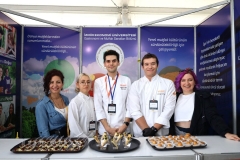
Aegean flavors from the chefs of the future
Izmir University of Economics (IUE) Department of Gastronomy and Culinary Arts left its mark on the 6th Izmir GastroFest, organized this year with
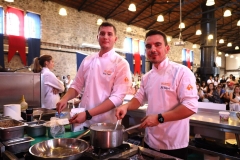
They added flavor to GURMEFEST
GURMEFEST, one of the biggest food, drink and entertainment festivals of Izmir, was ‘flavored’ with the dishes prepared and presented by the
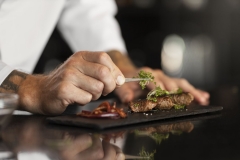
“Izmir and Bodrum will class up”
The MICHELIN Guide, one of the most prestigious restaurant rating systems in the world, has added Izmir and Bodrum to its Turkish
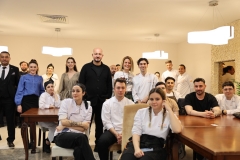
IUE graduates will prepare the flavors unique to Turkish cuisine
Bilsev Group, who is preparing to expand to Dubai this year with its Ferdi Baba, Fabrice Restaurant and Baba Pizza brands, will
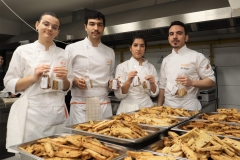
They prepared products that are filling and have a long shelf life
25 students of Department of Gastronomy and Culinary Arts of Izmir University of Economics (IUE) prepared products with a long shelf life,




